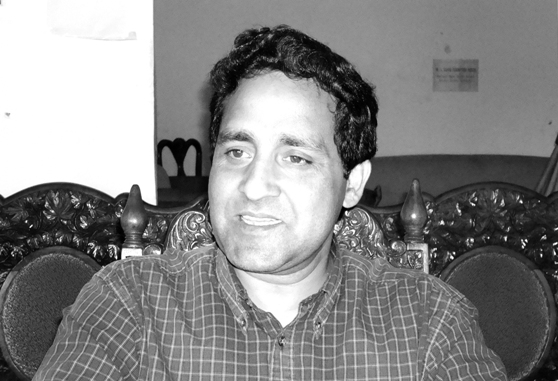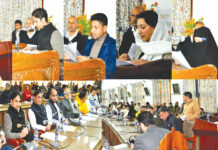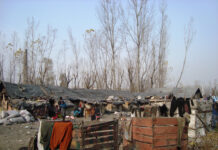Shakeel Qalander

Federation Chamber of Industries Kashmir (FCIK) sought liberal financial support from the 13th Finance Commission to transform a conflict economy into a self sustaining market oriented economy. It suggested using a 3D technology for measuring the terrain instead of taking line to line surface area into account. This, it believes, would hike J&K’s share in federal allocations by forty percent.
At the outset, we take this opportunity to introduce the Federation Chamber of Industries Kashmir as an integrated coalescence of industrial enterprises and their associations throughout Kashmir province in the State of Jammu and Kashmir. It enjoys a status of an absolute, paramount, and apex character having the authority to represent all segments and associations of industrial sector before the State and Central Governments and other fora with an objective to strive for overall growth, promotion and development of industry in harmonious proportions. The organization has also a mandate to raise and talk on socio-economic issues confronting overall development of the state. As on date, more than hundred industrial related associations based in Kashmir, are affiliated with FCIK which include all associations formed by the unit holders in organized industrial estates in the entire valley.
We would like to recall that immediately after achieving political independence it was felt necessary by the leaders of the Indian nation to sustain it by taking initiatives for effecting economic emancipation too, which entailed to laying a firm, progressive, and perpetual economic base. A number of measures in the form of industrial revolution and green revolution in the country were taken so as to minimize the import of industrial and agrarian products by paving a way for production of these basic amenities indigenously to the extent of self sufficiency and self-reliance.
The programme could not be implemented and nourished in the State of Jammu and Kashmir because of strained relationship of the state with the centre in the face of constitutional and political differences between the stalwart leadership of the State and Central Government. It was only after the historic Indira- Shiekh accord of 1975 that an economic programme was started here with fervour and enthusiasm which envisaged for a tri-dimensional purpose of economic elevation, industrial growth, and combating unemployment problem.
However, with the inception of turmoil in 1989, the economic activities got stagnated, in consequence where upon the strangulated business promoters exhausted their reserves and borrowed funds for their sustenance and for meeting up the recurring losses; and in the process got impoverished.
In past 20 years, whereas every individual suffered immensely with persistent threat to get killed by any gun, the state government got engaged rather entangled in tackling the situation almost forgetting about everything else. During the period, while the revenue expenditure of the state government increased manifold, the capital expenditure decreased substantially which revealed a decline in growth-inducing planned development expenditure. Not only the capital funds were diverted to meet the non-plan expenditures but there are instances where even the funds received for various centrally sponsored schemes were initially spent on non-plan expenditures resulting in extra-ordinary delay in the implementation of such schemes.
Besides, the successive state governments were forced to borrow high-interest borne loans for meeting their expenditure which on date have accumulated to alarming extent. In fact, the state, at present, is caught in the gallows of a miserable economic trap which eventually might lead it to fiscal collapse if not dealt with tangible measures.
In view of existing catastrophe which has predominantly shattered the economic development programme in the state to a disastrous level, it is incumbent upon the central government to take due cognizance of the problem in its right and correct perspectives and re-destine the fate and future prospects of the development in the state.
The process of transforming a conflict economy ravaged by militancy into a self sustaining market oriented economy where the normal processes work need structural interventions and strategic investments in selected sectors apart from paving a way for such investments through private sector or under public-private partnership. In this connection, the enhanced and liberal plan and non-plan allocations need to be made by the centre government to check inequality and imbalance of economic growth of the state in comparison to other states.
In the backdrop of aforementioned factors, the FCIK takes opportunity to request the visiting Chairman and members of 13th Finance Commission to use differential yardstick in allocation of non-plan funds so that the construction and re-construction initiatives, for accomplishment of a sound economic base in the state, are taken by the state government. While making allocations, the Finance Commission is requested to take cognizance of hilly terrains in measuring surface area by the application of 3D technology. By application of simple surface area formula by previous commission around 40% of surface area of the state has been ignored which ought to be made good. Among other desired initiatives, the Finance Commission is requested to allocate required and suitable funds for the following;
1. Debt Relief Package:
Grant of one time Debt Relief Package to the state government in order to liquidate its entire debt accumulated till date would be highly appreciated. This measure would save the state government from recurring expenditure on debt servicing including payment of huge interests that eats up its substantial non plan revenue and hampers development.
2. Compensation of Security Related Expenditure:
It has been observed that the expenditure incurred by the state government on maintaining the law and order situation is not being fully compensated by the centre. Security might be a non-plan function but in our state it has a different dimension and the resources of the state cannot be used for protecting a national interest. As such all expenditures relating to security including cost of establishment of J&K police since 1989 and newly created battalions need to be fully compensated by the finance commission. Besides SRE funds are required to be released on advance basis instead of reimbursement basis.
3. Compensating pay hike:
The pay hike granted by the central government to its employees as per the recommendations of 6th Pay Commission and its subsequent implementation in the state would additionally burden the state. The Finance Commission is requested to compensate the additional expenditure to the state government and remove all apprehensions about capital funds being diverted for the purpose.
4. Compensating expenditure on purchase of power:
Without going into the details of the losses meted out to the state for Indus water treaty or denial of due share from western rivers, the state government need to be compensated the entire expenditure of around Rs 2000 crores made annually on purchase of power for its supply to consumers in the state.
5. Funds for protection of environment:
The current shape of economy has not only halted new developmental and industrial activities but has also led to fallout of ecological management. Whereas the forest cover has depleted substantially in the last two decades, world famous lakes and water bodies have been turned into cesspools. The streams and rivers are fast drying up and old irrigation canals have silted up.
The Finance Commission is requested to formulize schemes for restoration of the glory of forests and water bodies with adequate funding.
6. Grant of Income Tax Exemption:
The condition of the people of Jammu and Kashmir state both in the business as well as service sector is pitiable owing to the two decade long turbulence that has wrecked their capacities and eroded their capital culminating in drastic reduction in their purchasing power and living standards. As such the Finance Commission is requested to consider grant of income tax exemption for the people of entire state which will pave way for the equitable growth of the state with other states of the country. Such an exemption is already granted to Ladakh province of the state.
7. Infrastructure Development for Capacity Building
Whereas a substantial investment for creating physical infrastructure is essentially required to enhance the growth potential of the state, the Finance Commission is requested to allocate suitable funds for the maintenance and up-gradation of existing infrastructure which presently is in dilapidated condition The focus need to be put on the following sectors;
a) POWER: Based on the enormous water resources, the state has a potential of generating over 20000 MWs of power but owns power projects that generate just 758 MWs including the recently launched 450 MW Bhagliar. The FCIK has been demanding for converting the existing J&K State Power Development Corporation into a listed Government company on the pattern of J&K Bank Ltd. Of late, the state Chief Minister has publicly acceded to this demand. The Finance Commission is requested to suitably fund the company for its establishment and other costs.
b) ROAD CONNECTIVITY: Owing to frequent road blockades on the national highway, no or inadequate road facility to various rural areas and regular traffic jams on important roads, the communication infrastructure need to be maintained, improved and upgraded on priority with liberal funding by the Finance Commission.
c) INDUSTRIAL INFRASTRUCTURE: The augmentation of industrial infra-structural requirements and re-development of existing infrastructural facilities need to be taken up on priority. For almost two decades no land for industrial purpose has been acquisitioned in the state for establishment of new industrial estates resulting in scarcity of industrial plots. Besides, owing to lack of integrated facilities, the existing industrial estates wear a look of graveyards. The Finance Commission is requested to allocate sufficient funds for enhancing the facilities in existing industrial estates.
8. Skill development for increased employability:
Despite the growing unemployment in the state, industry faces acute shortage of skill for various industrial activities. In order to motivate school drop outs for receiving training of various trades at the vocational training centres, a stipend of Rs 1000 per month need to be paid to each trainee till completion of their training.
Stipend for the trainees of handicraft training centres also need to be enhanced to Rs1000 per month in order to reverse the depleting number of artisans.
Besides the training centres need to be up-graded as well as new centres established in order to increase the intake capacities of centres. The Finance Commission is requested to allocate suitable funds for the purpose.
9. Expansion of economic resource base through industrial development:
The industrial policy in place has failed in achieving desired objectives because it failed to address some of the basic issues confronting the industrial growth as a result of which the entrepreneurs of state could not avail any mentionable benefit from it. The Finance Commission may kindly allocate funds for the following;
a) Compensation of business losses to entrepreneurs for the days of curfews and strikes by debit to Security Related Expenditure.
b) Rentals, business losses and compensation for damaged buildings/plant and machinery of units under the occupation of security forces by debit to SRE.
c) Revival and Rehabilitation of sick industrial units be taken in hand. Besides, the industry in the state is afforded with remission on VAT as a cost equalizer for maintaining competitiveness. We request for maintaining such a remission to our industry in the event of application of Goods and Services Act.
10. Revival of Public Sector Undertakings:
Sufficient funds need to be allocated for revival of public sector undertakings that too have turned sick owing to incessant incertitude. In particular the J&K State Financial Corporation need to be fully compensated for the waiver of interest that it granted to business enterprises including those belonging to migrant entrepreneurs.
*Author is president FCIK.













